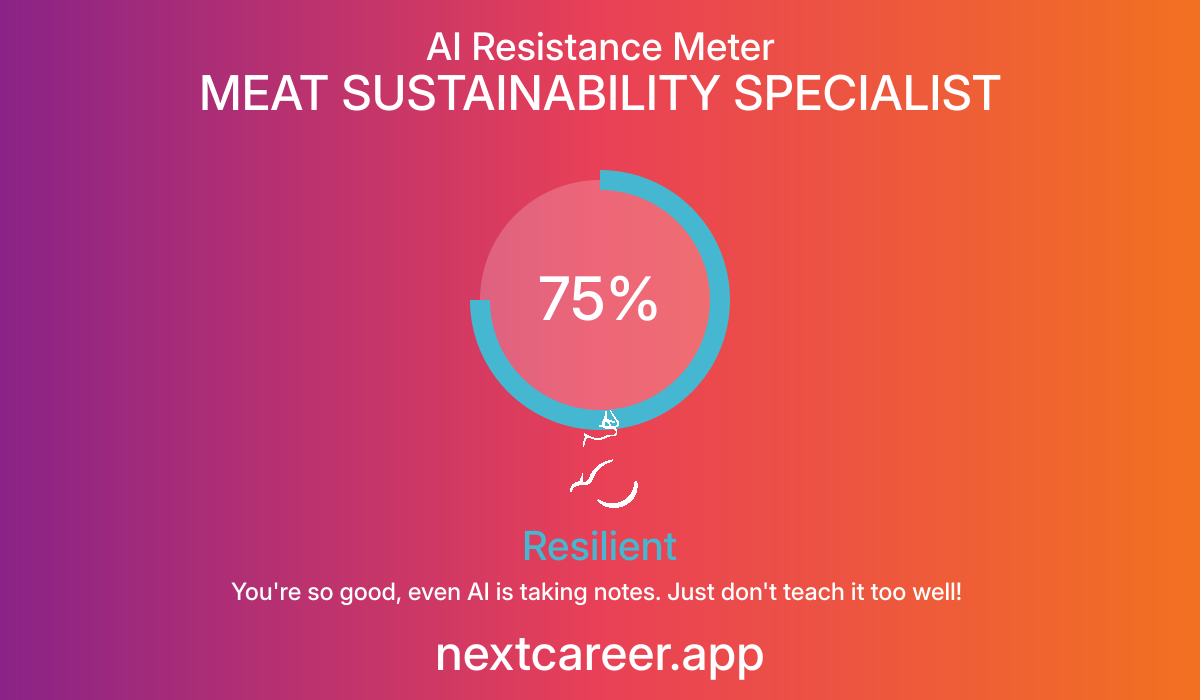AI Resistance Analysis
MEAT SUSTAINABILITY SPECIALIST
MEAT SUSTAINABILITY SPECIALIST
AI Resistance Score
AI Resistance Meter
Resilient
MEAT SUSTAINABILITY SPECIALIST
You're so good, even AI is taking notes. Just don't teach it too well!
The role of a Meat Sustainability Specialist requires a blend of technical knowledge in agricultural practices, environmental science, and an understanding of food economics. With the advent of AI, certain aspects of data analysis and predictive modeling can be automated, but tasks involving nuanced decision-making, stakeholder engagement, and adaptability in response to social and environmental changes are less likely to be fully replaced by AI in the near and long term. The score reflects a high degree of AI resistance due to the cognitive, emotional, and creative aspects inherent in the role.
The role of a Meat Sustainability Specialist requires a blend of technical knowledge in agricultural practices, environmental science, and an understanding of food economics. With the advent of AI, certain aspects of data analysis and predictive modeling can be automated, but tasks involving nuanced decision-making, stakeholder engagement, and adaptability in response to social and environmental changes are less likely to be fully replaced by AI in the near and long term. The score reflects a high degree of AI resistance due to the cognitive, emotional, and creative aspects inherent in the role.
Key Factors
- Cognitive Tasks: While data collection and analysis can be automated, critical thinking regarding sustainable practices and adapting methodologies cannot be easily replicated.
- Emotional Intelligence: Building relationships with stakeholders, farmers, and consumers requires empathy and social skills, which are challenging for AI to replicate.
- Physical Skills: On-site evaluations and field assessments may involve physical skills but can be supplemented with AI tools for data collection.
- Creative Thinking: Innovating sustainable practices and solutions requires creative problem-solving that is inherently human.
Human Advantages
- Interpersonal communication skills for stakeholder engagement
- Adaptability to changing environmental regulations and social attitudes
- Creative problem-solving for innovative sustainability solutions
AI Vulnerabilities
- Standardized data analysis tasks
- Automated reporting and compliance checks
Recommended Actions
- Invest in continuous education on AI tools and their applications in sustainability.
- Develop skills in stakeholder engagement and negotiation to enhance emotional intelligence.
- Focus on interdisciplinary knowledge, integrating technology, agricultural science, and environmental ethics.
- Encourage innovative thinking through collaborations with tech companies to harness AI effectively.
In the near term (5 years), AI will assist in optimizing supply chains and predictive analytics related to environmental impacts, but human expertise will remain critical for nuanced decision-making. In the long term (20+ years), the role may evolve to focus more on strategic sustainability initiatives as AI takes over routine analysis. Therefore, the need for collaboration with AI tools will increase, and specialists must embrace continuous learning to remain relevant.

Why Calculate AI Resistance?
Understanding how AI-resistant your career is becoming increasingly important in today's rapidly evolving job market. Our analysis combines multiple factors including required human skills, technological adaptability, and future industry projections to give you a comprehensive view of your career's sustainability.